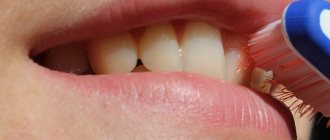Consultation with a doctor When it comes to the oral cavity, the expression “you are what you eat” becomes truly meaningful. Sweet foods such as sugar, candy, and carbonated drinks lead to the destruction of tooth enamel. Other foods, such as dairy products or vegetables, on the other hand, help fight plaque buildup and act like a natural toothbrush, delaying dental treatment for longer.
So, what foods promote dental health?
The influence of nutrition on dental health
To maintain oral health, a number of microelements are required - calcium, fluoride and phosphorus. A person gets them from food. If the diet contains few healthy and micronutrient-rich foods, the enamel weakens and is more difficult to restore.
Dental plaque is a thin, invisible film on the teeth that maintains the health and microflora of the mouth. When a person eats sugary or starchy foods, it reacts with plaque to form acids. These acids attack the enamel, destroying it.
Consuming sugar in small quantities will not lead to tooth decay or inflammatory diseases. But if harmful foods are constantly in the diet, then undesirable consequences will certainly arise, and treatment of caries cannot be avoided.
Excess sugar and lack of calcium and phosphorus leads to caries and inflammatory diseases of the oral cavity.
Why do children's teeth crumble?
Sometimes children experience tooth fragility due to a difficult pregnancy and difficult birth of the mother. But most often, a child’s teeth crumble due to a large amount of sweet or sour foods in the diet and poor oral hygiene. In addition, active children sometimes get injured, damaging their teeth, which can subsequently lead to their destruction. Therefore, visiting the pediatric dentist should be a good habit to keep children's teeth healthy.
Products that are harmful
What is good for your teeth is good for your entire body. Poor nutrition causes physical and psychological problems. Oral diseases lead to a decrease in overall immunity. And with pain or active inflammation, it will be difficult to eat and communicate.
So, harmful foods for teeth are:
- Sweets. This includes chocolate, cakes, cookies, candies. The sugar contained in these products settles on the enamel and subsequently destroys it. Also, crowns and fillings placed on teeth wear out faster. The worst are those sweets that are difficult to clean out of the mouth, like candy or caramel. Small pieces of caramel get stuck between teeth. This is significantly worse than, for example, chocolate, which easily washes out when brushing or rinsing.
- Soft drinks. Store-bought soda and iced tea contain equal amounts of harmful sugars, which erode tooth enamel and lead to tooth decay. It is better to give up such drinks and switch to water or unsweetened loose leaf tea. If it is difficult to give up carbonated sweet drinks, then after each use you should rinse your mouth with warm water.
- Hard and starchy foods. These are crackers, chips, popcorn, nuts and dried fruits. They not only get stuck between the teeth, but also scratch the enamel and gums. Scratches turn into small cracks. Food will get stuck there, which will lead to inflammatory processes.
- Sour. Citrus fruits and juices from them, lemon and berries - all this harms teeth. High acid content is harmful to oral health. It is worth limiting the consumption of foods with high acidity. It is advisable to drink juices through a straw - contact with the enamel will be significantly reduced, along with the risk of undesirable consequences.
- Coloring products. Black currants and chokeberries strongly stain tooth enamel. But these berries also contain vitamins that are good for teeth. So you can eat them, but you shouldn’t overuse them. The second product is coffee. It is not only capable of staining the enamel dark, but also leaching calcium from the enamel. Therefore, it is better to reduce coffee to 1 cup per day or, if possible, completely abandon it. Professional teeth whitening will give longer lasting results if you follow a “white” diet.
Top 3 most harmful sweets for teeth:
- Taffy. And not only toffees, but also all sticky and viscous sweets: chewing candies, toffees, soft sticky caramel. Such candies are the most dangerous for teeth for one simple reason: they stick to teeth and get clogged in the interdental spaces, and then destroy the enamel over time. A piece of toffee stuck to your teeth, which you don’t even feel, will slowly dissolve and be “eaten” in the evening at best, and maybe it won’t leave you even after brushing your teeth if you are not careful enough. 2. Caramel. Caramel contains a record amount of sugar, often softens when consumed and, like toffee, sticks to the teeth in hard-to-reach places. In addition, it takes a decent amount of time to eat caramel - and all this time your teeth are left to be torn apart by destructive bacteria and acids.
- Lollipops. In terms of their effect on teeth, lollipops are similar to caramel, but they have another unpleasant property: they are very hard, therefore, when they hit the teeth, they can leave microcracks in the enamel. And microcracks, as we know, not only increase the likelihood of developing caries in the future, but also reduce the strength of teeth, making them more fragile and vulnerable to injury, chips, etc.
A separate conversation is about the effect of dried fruits and fruits on teeth. On the one hand, these products are healthy and are an excellent substitute for sweets, but there are several “buts” in this idyll:
- Dried fruits containing high concentrations of fructose, that is, natural sugar (which can harm teeth no worse than refined sugar), should be eaten wisely. Very sweet raisins, for example, are viscous in the pulp and, like toffees, can stick to the teeth and get clogged in the interdental spaces. And candied fruits (dried pineapple, papaya, kiwi, etc.) generally contain refined sugar and are no different from ordinary sweets and other sweets in terms of their effect on teeth.
- Some acidic fruits - especially citrus fruits - contribute to the destruction of enamel due to their high content of fruit acids. This is why dentists do not recommend digging your teeth into oranges and lemons: when eating citrus fruits, you need to minimize the contact of the fruit with tooth enamel, and when drinking citrus juices you should use a straw. By the way, acid is also often found in fruit-flavored candies, which is why candies can be considered doubly harmful.
Products good for teeth
- Dairy products. Milk, yogurt, cheeses and cottage cheese are the main products that strengthen teeth. They are rich in microelements necessary for enamel - phosphorus, calcium and fluorine. As well as the protein casein, which is involved in the formation of protective plaque. Dairy products also contain vitamin D, which helps calcium be absorbed properly. The main thing is to choose dairy products without sugar or sweet additives.
- Greenery. Leafy greens are always at the top of the list for healthy foods. It is full of vitamins and microelements that are so necessary for the body and, in particular, teeth. Calcium, folic acid, B vitamins strengthen enamel and reduce inflammatory processes, which can prevent rapid gum treatment.
- Hard vegetables and fruits. Apples, pears, carrots, celery and cucumbers contain a full range of vitamins and minerals. This helps to form the correct microflora in the oral cavity and strengthen teeth. The fibrous, hard structure of fruits and vegetables works like a toothbrush - a natural massage of the gums and a complete cleansing of the oral cavity.
- Water and weak teas. Water helps get rid of food particles between the teeth and rinses the mouth. This not only prevents inflammation, but also eliminates bad breath. Tea - green, white or weak black - also has a positive effect on the condition of the enamel. Green tea contains fluoride, which is essential for teeth.
- Seafood. It is known that fish and other seafood are the main source of omega-3, phosphorus, calcium and fluoride. All these microelements are necessary, so eating fish will definitely improve the condition of the oral cavity.
Each product affects not only the general condition, but also the health of the oral cavity. It is important to maintain a healthy balance in your diet, focusing on healthy foods and reducing harmful ones to a minimum.
After eating unhealthy food, you should rinse your mouth with water to minimize the negative effects.
The main thing is not to forget to brush your teeth twice a day and use special floss.
Professional oral cleaning will help you maintain a beautiful and healthy smile. The doctor's consultation
The main reasons for the fragility of dental crowns
What became the root cause of the processes that destroy teeth can only be determined by a dentist. His arsenal includes diagnostic studies and clinical experience, thanks to which it is customary to identify the following factors that cause teeth to crumble:
- Dietary disorders. It is not a myth that excessive consumption of sweets destroys tooth enamel. In a sweet environment, microbes that cause caries multiply with great intensity. Therefore, it is recommended to drink a lot of liquid so that the saliva is not thick, viscous and has a good antibacterial function. The fewer simple carbohydrates in your diet and the more foods containing calcium and vitamin D, the better for your teeth.
- Poor hygiene. It is obvious here that insufficient brushing of teeth and removal of food debris from the oral cavity leads to a massive proliferation of microorganisms that cause caries.
- General condition of the body. Chronic diseases often cause tooth fragility. Most often these are problems in the endocrine system (diabetes). In addition, the natural and completely healthy state of pregnancy can also cause problems with teeth due to metabolic disorders in the body of the expectant mother.
- Anatomical disorders in the structure of teeth and jaw. In case of malocclusion pathologies or violations of the integrity of the dentition, disturbances in the distribution of loads during chewing are observed, which leads to premature wear of the enamel, cracks, and chipped teeth.
- Ecology. Often, the condition of a person’s teeth reflects the quality of the water that he drinks, indicates the presence of high levels of radiation and the content of chemicals in the air.
- Rare visits to the dentist. A specialist will always notice dental problems at an early stage and will not allow a process to start that will destroy the teeth. If you visit the doctor more often, you will have to treat your teeth less often, since regular dental examinations prevent the occurrence of serious pathologies that require long and painful treatment.
Separately, it is worth highlighting wisdom teeth, which already at the beginning of their growth can be fragile due to their unfortunate location, pathological growth and other reasons.
Rules
Dentist recommendations for maintaining a beautiful and healthy smile:
- Drink more water;
- Eat fresh fruits, berries, greens, which are the main source of vitamins and minerals;
- Fresh nuts and seeds;
- Algae that contain amino acids and iodine;
- Herbal teas, chicory;
- Never chew foods and objects that are not intended for this with your teeth;
- Brush your teeth at least twice a day.
Get a preventive examination every six months at Olis-Dent dentistry to promptly detect and prevent the occurrence of dental diseases.
How can a dentist help?
Depending on the degree of tooth decay, stage and causes of fragility, as well as taking into account the natural appearance of the dentition, the doctor selects treatment methods:
- Installation of fillings - used when the tooth has crumbled slightly and it is possible to restore it completely.
- Veneers - ceramic onlays will be the solution if the front tooth has crumbled and it is impossible to restore it to its original aesthetic state.
- Inlays – if a chewing tooth is destroyed by 50%, inlays will help; their advantage is that they are more durable and airtight than fillings and can withstand loads well.
- Crowns – if the crown part of the tooth is completely destroyed, prosthetics with crowns are necessary.
- Removal and implantation - if the tooth is crumbled and the tooth root is also almost destroyed, it is removed, and then implantation is carried out and a crown is put on.
Our dentist will select a method based on the individual characteristics of the teeth, their location and condition. It is worth noting that regular visits to our clinic reduce the risk of tooth decay. Visit your dentist at least once a year for a professional examination to avoid serious diseases and complex long-term treatment for them.
Why does the enamel on teeth wear off?
According to scientists, the enamel on teeth wears off for various reasons. Typically, fabric stability is affected by:
- individual characteristics of the structure of teeth;
- genetic predisposition;
- hormonal background;
- mechanical injuries;
- frequent temperature changes when eating hot and cold foods at the same time;
- quality and quantity of saliva;
- calcium and fluorine content in tissues;
- Toothbrush;
- bad habits - smoking, alcohol abuse;
- frequent consumption of sweets, citrus fruits, fruit juices, sodas.
In addition, the enamel on teeth begins to wear off with age. As the body ages, metabolic processes slow down and hormonal stability is disrupted.
Most often, the enamel on the lateral incisors wears off, and less often on the molars.










